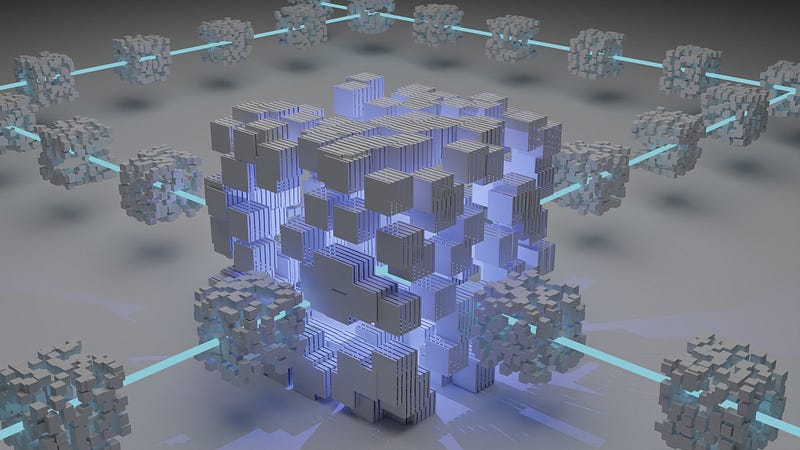Decoding Decentralization: The Transformative Power of Blockchain
Written on
Chapter 1: The Promise of Decentralization
In the early days of the internet, there was a vision of a decentralized world where information could flow freely and everyone's voice could be heard. However, over the years, that ideal has largely given way to a more centralized reality. Fortunately, the emergence of blockchain technology holds the potential to redirect us toward that original vision.
If you're reading this, you probably have a basic understanding of blockchain, often mentioned alongside cryptocurrencies. Bitcoin, Ethereum, and Dogecoin have become iconic examples, but the narrative extends far beyond these popular names.
Let's begin by unraveling the concept of decentralization. Currently, our personal data, identities, and privacy are predominantly managed by major tech corporations we have come to depend on. But what if we had greater autonomy? What if we could control how our data is utilized? This is where decentralization and blockchain step in.
In its simplest form, blockchain is a type of Distributed Ledger Technology (DLT) that allows data to be stored across various devices located in different places instead of relying on a single central database. Think of it as a public digital ledger that records every transaction, making it transparent and secure for all participants.
The ramifications of this technology are significant. The decentralization enabled by blockchain is more than just a technological advancement; it signifies a philosophical evolution in our engagement with digital information. It paves the way for a more democratic and fair digital environment where power is redistributed from centralized authorities back to users.
While blockchain initially gained traction in the financial sector and cryptocurrencies, its potential applications are vast and varied. It is transforming industries such as healthcare, supply chain management, and the creative arts. Let's delve deeper into these sectors.
Section 1.1: Transforming Healthcare
Healthcare is one industry poised for a revolutionary shift through blockchain. This technology can offer a secure, verifiable, and permanent method for recording health-related data. It could radically change how patient information is managed, enhancing privacy and interoperability. Imagine a scenario where your medical records are instantly accessible to any authorized healthcare provider, no matter where they are located.

Section 1.2: Enhancing Supply Chain Transparency
Supply chains have long struggled with issues of transparency, traceability, and fraud. Blockchain presents a compelling solution, enabling consumers to track a product from its origin to its final destination. This not only guarantees authenticity but also builds consumer trust.
Chapter 2: The Creative Arts and Blockchain
The rise of Non-Fungible Tokens (NFTs) has thrust blockchain into the spotlight within the creative sector. This technology provides a secure avenue for monetizing digital art, allowing creators to retain ownership rights and receive fair compensation for their work. It's a significant advancement for artists and creators globally.
In the video "How Bitcoin and Blockchain Will Change the World," experts discuss the transformative potential of blockchain technology and its implications for various sectors.
Despite the promising applications of blockchain, it is crucial to acknowledge that it remains an emerging technology. It faces challenges such as scalability, energy consumption, and regulatory uncertainties. However, the potential benefits are so profound that they warrant serious consideration.
As someone who has been navigating the complex landscape of cryptocurrency since 2015, I can attest that the journey with blockchain is both exhilarating and enlightening. It invites us to consider the broader societal impacts of this technology.
The second video, "Will Crypto and Blockchain Be the Downfall of the State?" explores the potential societal shifts that blockchain may bring, raising questions about its impact on governance.
In conclusion, blockchain technology and its associated decentralization offer a promising path toward a future characterized by transparency, security, and autonomy from centralized authorities. It represents an opportunity to recreate the internet as it was originally envisioned—a truly decentralized and open network.
The future is brimming with potential as we stand at the cusp of this technological revolution. The blockchain landscape is in a constant state of flux and innovation, and I am eager to witness the directions it will take.
Thank you for joining me on this exploration of blockchain and decentralization. If you found this article insightful, I encourage you to share it with others. The blockchain revolution is only beginning, and there's a place for everyone to participate.
For those interested in further insights, consider subscribing to my newsletter for in-depth reflections. If you're ready to navigate the world of cryptocurrency with me, check out my Patreon for monthly updates, airdrops, and coin tips. Connect with me on your preferred social media platforms, and feel free to reach out for personalized coaching sessions.